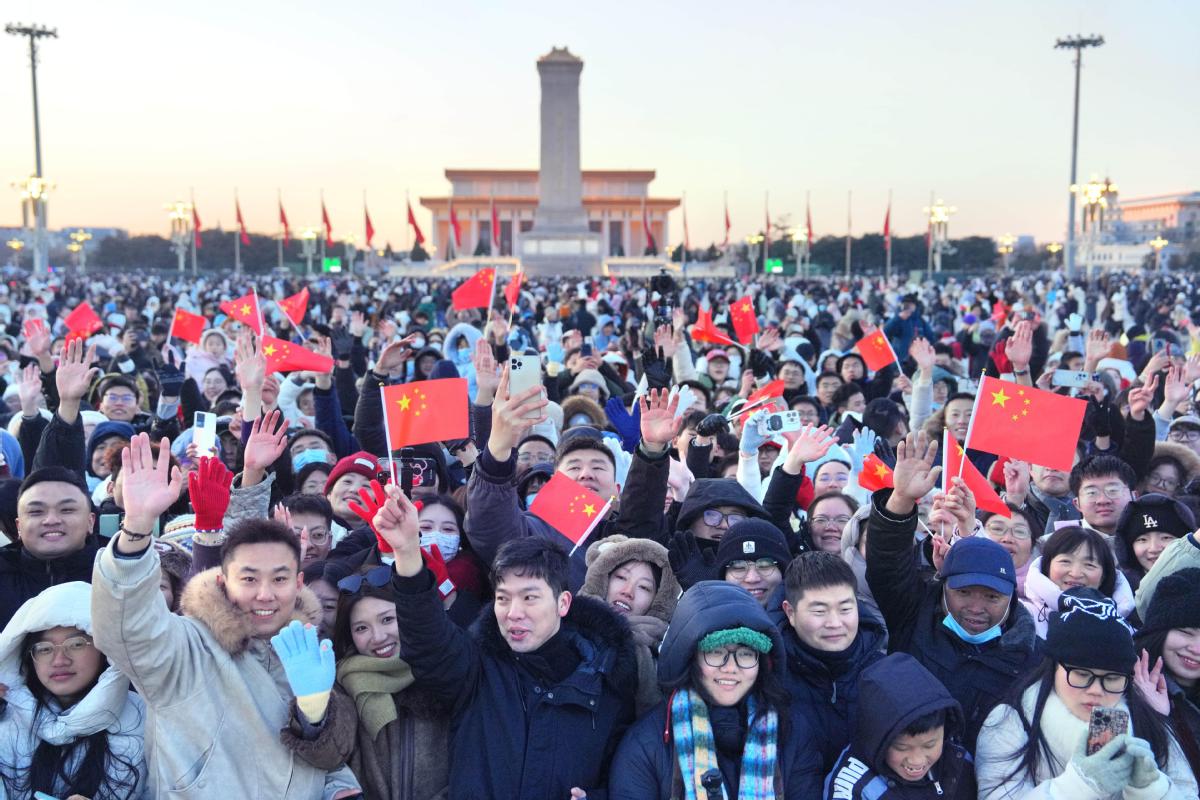Stories of High-Quality Development: Prime time for China's private economy to shine

"The private sector enjoys broad prospects and great potential on the new journey in the new era. It is a prime time for private enterprises and entrepreneurs to give full play to their capabilities," General Secretary Xi Jinping emphasized at a symposium on private enterprises held on Feb 17, 2025.
Since the 18th National Congress of the Communist Party of China, the private economy has continued to expand, emerging as a vital force in advancing Chinese modernization.
From DeepSeek's large language model captivating the global stage, to Unitree Robotics' robots dazzling on the stage of the CCTV Spring Festival Gala, and the worldwide sensation of Game Science's "Black Myth: Wukong" — their rise is not only a reflection of China's innovative vitality, but also a powerful testament to the vast prospects of the private economy and the remarkable contributions made by private enterprises in the new era.
Following the historic journey of reform and opening up, China's private economy has grown from humble beginnings into a formidable force, said Li Zhaoqian, president of China Society for the Study of the Private-Sector Economy, at People's Daily's "Stories of High-Quality Development" video series. In the new stage of development, the Party and the country's theories and policies on the private economy are becoming increasingly refined; the overall strength, innovation capability, and market competitiveness of the private economy have been significantly enhanced; China's long-term economic fundamentals remain sound and unchanged; the market-oriented, law-based, and internationalized business environment continues to improve... The high-quality development of the private economy is ushering in an era of opportunity with "great potential."
Leveraging strengths and enhancing independent innovation
29 years ago, in a lab at Tsinghua University, a few young people stared excitedly at a piece of luminous glass. It was China's first OLED test piece.
"From that tiny lab chip to today's globally used 'China Screen', it's been a journey spanning over 20 years," said Zhang Deqiang, chairman and president of Visionox Technology Inc. For him, innovation is never a sprint, it is a marathon without a finish line. The courage to dream, the guts to act, and the grit to persevere keep driving private enterprises to innovate.
As an important force driving scientific and technological innovations, private enterprises contribute to over 70 percent of China's technological innovation.
"Private enterprises are known for their keen innovation and market instincts, high efficiency in achieving results, and flexible incentive mechanisms — traits that align closely with the demands of technological and industrial innovation, which call for innovation-driven growth, risk-taking, and long-term investment," Li said.
He added that a new wave of scientific and technological revolution and industrial transformation is currently accelerating, leading to a rapid restructuring of global innovation and industrial chains. In this era of profound changes unseen in a century, private enterprises are taking proactive measures, strengthening their role as key innovators and rapidly capturing opportunities in new fields. These efforts not only create new blue oceans and broaden development prospects for themselves, but also help China gain an early advantage in cultivating new quality productive forces and pioneering a new phase of high-quality development.
Transforming, upgrading, and building internal capabilities
Over four decades of reform and opening up, transformation and upgrading have become a "mandatory course" for the sustainable development of private enterprises.
At a fully automated future factory of Hangzhou Robam Appliances Co Ltd production featuring "no lights, no hands" has increased efficiency by 45 percent, reduced production costs by 21 percent, and raised the ratio of qualified products to 99 percent.
As a private firm operating 46 years in the kitchen appliance industry, Robam began its digital transformation in 2010.
"Looking back, we know we chose the right path with our transformation," said Ren Fujia, chief executive officer of the company, adding that transformation isn't about discarding tradition — it's about giving it new life in a new era.
China's economy has transitioned from high-speed to high-quality growth. The private economy is rapidly shifting from traditional labor-intensive sectors toward higher-value segments of the industrial chain like services and advanced technologies, Li pointed out.
Facing challenges posed by the shift in economic development patterns, economic structural optimization and the emergence of new growth drivers, private enterprises must enhance their "internal capabilities." This strategic focus is not merely a response to market challenges but a pathway to enduring, high-quality development.
Accelerating global expansion and becoming world-class players
Transfar is a typical representative of Zhejiang's "sweet potato economy," which means an enterprise's headquarters are located locally in Zhejiang while its markets and resources are both outside the province.
39 years ago, the company's entrepreneurial journey began with nothing more than a large vat and a bicycle. Today, its operations span the globe, and it's marching towards the goal of becoming a world-class enterprise.
"Going global was a key step forward for us," explained Xu Xun, vice-president of Transfar Group. He believes that competing in broader markets has pushed private enterprises to continually elevate their competitiveness, resulting in sustained growth and breakthrough achievements.
According to Li, "going global" is not merely a strategic decision for Chinese enterprises to leverage their strengths in international division of labor and pursue win-win cooperation — it is also an imperative response to evolving macroeconomic conditions and industrial development stages. More crucially, it represents an essential pathway to harness both domestic and international markets and resources, with which Chinese private enterprises can move to the higher end of the value chain, and emerge as world-class players.
The Chinese market is deeply intertwined with the global market. Li said that the current international landscape is complex and volatile, underscoring the unique role and value of private enterprises' global expansion. "As more supportive policies and institutional safeguards take effect, we anticipate even greater contributions from private enterprises on the world stage," he said.
It is undeniable that the development of the private economy currently faces some problems and challenges, but these are surmountable.
According to Li, from the perspective of enterprises, it is important to unswervingly pursue high-quality development, continuously improve management standards, focus on core business, strengthen the real economy, boost tech-driven innovation and industrial innovation, and intensify efforts to tackle key core technologies and continuously enhance quality, efficiency and core competitiveness. It is crucial to uphold integrity and comply with the law in business operations, and establish correct values and ethical principles. Further efforts are needed to cultivate a cordial and clean relationship between government and business.
From an external perspective, efforts must be made to ensure the effective implementation of policies and measures for promoting the private sector's development. Key concerns of private enterprises must be addressed by enhancing policy precision and aligning measures with macroeconomic goals. It is important to improve coordination across economic policies, non-economic policies, and policies introduced by different departments, and ensure policy stability, continuity, and predictability.
Opportunities always coexist with challenges.
Looking ahead, the policy winds are strong, the innovation wave is surging, and the market's blue ocean is ready to be unleashed, creating vast spaces for private enterprises to thrive. Private enterprises and entrepreneurs should keep the nation's fundamental interests in mind, seize the opportunities of the times with the courage to ride the waves, and boldly tackle development challenges. With such resolve, they can work toward ushering in a new chapter of high-quality development for the private economy.
- 'Separatist fallacy' of Lai Ching-te 'doomed to fail'
- Shanghai Symphony Orchestra rings in the new year
- New power station opens in Shanghai
- Series on Shanghai revolutionary sites airs
- Xu Beihong's horse-themed art exhibition opens in Shanghai
- China has enhanced social safety net: government minister



































